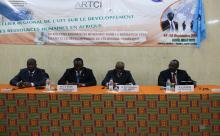
Abidjan, Côte d’Ivoire, 14 – 18 September 2015, officially opened. The regional workshop on the role of Human Resources in the migration to Digital Terrestrial Television Broadcasting (DTTB) and the development of the digital Economy was officially opened on the 14th September 2015, by Mr. Bile Diemeleou, representing the Minister of Posts and Information Technology and Director General, Autorité de Régulation des Télécommunications de la Côte d’Ivoire (ARTICI).

Mr Diemeleou encouraged all attandees of the workshop to fully engage in the discussions so that they could be able to know all the challenges of human resources related to the shiftover from analog to digital terrestrial television broadcasting. In his welcome remarks, ITU Regional Director for Africa, Mr Andrew Rugege thanked the Government of Cote d’Ivore for offering to host this important regional workshop and for bringing all necessary support to its success. He reiterated the commitment of ITU to continue assisting ITU Member States with developing competent and well-trained human resources capable of responding efficiently to all challenges posed by the fast-changing nature of ICT in today’s world. Mr Rugege further stated that this workshop is organized to provide the right response to the concerns of all the actors of the telecoms/ICT sector and to ensure that the skills that would be gained by the actors through this workshop will effectively help them manage the growth and development of their activities back home. To emphasize that this workshop is only the beginning for continued collaboration of the workshop participants and the ITU, he said “I am confident that they will keep abreast through other upcoming ITU face to face training workshops or online capacity building modules through our various Centers of Excellence disseminated all over Africa.” Mr Rugege concluded his speech by indicating that it is a truism that the fast-changing telecommunications/ICT environment has brought about various challenges faced by the HR managers in the sector making it mandatory to be more proactive to anticipate the emerging trends of development and training needs of the sector.